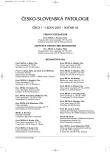-
Medical journals
- Career
Toxicological Criterion of the Heroin Poisoning
Authors: S. Shigeev
Authors‘ workplace: Russia ; Department of Forensic Medicine Faculty of Medicine People’s Friendship University of
Published in: Soud Lék., 52, 2007, No. 1, p. 17-20
Overview
The paper presents toxicological characteristics of 198 cases of acute parenteral heroin intoxication, analyzes the clinically encountered range of blood and urinary concentrations of its metabolites. The principal causes of death are elucidated in victims of heroin poisoning at the hospital stage. Where there is a relationship of death probability to the detection of morphine in the victims’ biological fluids is considered; its blood and urinary concentrations are determined, which undoubtedly suggests the occurrence of poisoning-related death. It has been established that death from poisoning by heroin may occur in the whole range of its detectable concentrations. There is no doubt that the blood morphine concentrations of at least 2.0 μg/ml should be considered to be fatal.
Key words:
morphine – morphine concentration – heroin poisoning
Labels
Anatomical pathology Forensic medical examiner Toxicology
Article was published inForensic Medicine

2007 Issue 1
Most read in this issue- Severity of Opiate Intoxication to Gender and Age
- Toxicological Criterion of the Heroin Poisoning
- Medicolegal Practise in Florida, USA
- The Use of Cell Cultures for in Vitro Decompression Sickness Simulation
Login#ADS_BOTTOM_SCRIPTS#Forgotten passwordEnter the email address that you registered with. We will send you instructions on how to set a new password.
- Career

